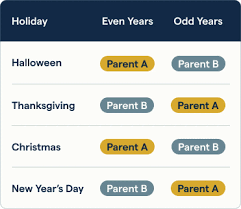


Navigating Child Custody and Visitation Schedules During Holidays in Nigeria: A Comprehensive Guide to Resolving Disputes
Introduction
Child Custody And Visitation During Holidays;
The holiday season can be a joyous yet challenging time, especially for families navigating the complexities of child custody and visitation schedules in Nigeria. With the festive season often bringing changes in routines and heightened emotions, disputes over visitation rights and custody arrangements can arise, making it crucial for parents to manage these situations thoughtfully and legally. This guide aims to provide parents, guardians, and legal practitioners with a comprehensive understanding of how to navigate child custody and visitation schedules during holidays in Nigeria, ensuring that the best interests of the child remain at the forefront.
Navigating the complex terrain of child custody and visitation in Nigeria, particularly during festive seasons, can be emotionally charged and legally intricate. The holidays—whether Christmas, Eid, school vacations, or other culturally significant breaks—often stir up heightened emotions for separated or divorced parents who both wish to spend quality time with their children. In Nigeria’s diverse social and legal landscape, these conflicts are increasingly common and require practical, legal, and child-centered approaches for resolution. The importance of maintaining a child’s well-being while honoring parental rights cannot be overstated.
Holidays tend to emphasize family togetherness, joy, and bonding, yet for families grappling with separation or divorce, they can also bring anxiety, tension, and disputes. Parents frequently find themselves locked in arguments over who gets to have the child and for how long. Often, these disagreements become legal battles that could have been avoided with prior planning or alternative dispute resolution. In many cases, especially where existing custody orders lack detailed holiday arrangements, parents feel frustrated, powerless, and emotionally drained. Worse still, children may end up as the unintended victims of these conflicts, forced to endure loyalty battles or even emotional trauma due to inconsistent visitation or sudden schedule changes.
Nigeria’s family law system does provide a framework for resolving custody and visitation disputes, but the enforcement of these frameworks depends significantly on the nature of the divorce settlement or the parenting plan agreed upon—or the absence thereof. When holidays approach, urgency often overshadows good judgment. Parents who did not anticipate future conflicts during the drafting of custody agreements may find themselves without a clear legal solution at a critical time. Consequently, many resort to the courts, sometimes too late for meaningful intervention.
The courts in Nigeria prioritize the “best interest of the child” principle in any custody or visitation dispute. This includes ensuring the child’s emotional, physical, and psychological needs are met, especially during sensitive periods like holidays. Judges often consider the child’s age, schooling, prior bonding patterns with each parent, and stability of each home. That said, litigation should be a last resort. Families are strongly encouraged to seek amicable resolutions outside courtrooms, using mediation, negotiation, or professional legal advice to forge mutually beneficial holiday schedules.
Legal practitioners also have a pivotal role to play here. They not only interpret custody orders and advocate for their clients’ rights but also help parents to understand the long-term consequences of unresolved visitation conflicts. An experienced family lawyer can assist in drafting or modifying agreements that include detailed holiday schedules—preventing confusion, hostility, or even contempt of court proceedings. They can guide parties through formal dispute resolution methods that preserve relationships and prioritize the child’s emotional stability.
Religious and customary factors also add layers of complexity to these issues. In Nigeria, both statutory law and customary law operate side by side. In many customary settings, custody decisions may lean toward extended family involvement, particularly during festive seasons. Where both parents practice different religions, deciding which holidays are honored in the schedule can trigger conflict. Also, the Nigerian legal system is increasingly encountering cases where one parent resides abroad and the other is locally based, complicating visitation logistics during holidays.
It’s also worth noting the role of enforcement agencies and court registrars during the holidays. Due to increased workloads and potential shutdowns during festive periods, parties may experience delays in securing emergency court orders or enforcement. This reality further highlights the need for early planning and pre-agreed visitation frameworks. Drafting a well-structured, legally recognized holiday parenting plan can avert crises, protect parental rights, and most importantly, provide a sense of predictability and comfort for the child.
Parental cooperation is the bedrock of any successful holiday visitation arrangement. Emotional maturity, clear communication, and a child-first mindset can transform what could be a source of conflict into an opportunity for collaboration. Parents who actively prioritize their child’s happiness over their personal grievances tend to develop long-term workable systems. These efforts help the child feel secure and loved despite the family dynamic changes.
As societal awareness increases, more Nigerian families are proactively addressing holiday custody issues in their parenting plans. Courts, legal practitioners, and family counselors are also stepping up to ensure that families receive the guidance they need to avoid conflict. However, more needs to be done to educate the public about their legal rights, how to modify custody arrangements, and how to enforce them effectively when necessary.
Ultimately, navigating child custody and visitation during holidays in Nigeria requires legal insight, emotional intelligence, and a deep commitment to the child’s welfare. The path is not without challenges, but it is navigable—with the right support, adequate preparation, and a solution-oriented mindset.
Understanding Child Custody and Visitation Laws in Nigeria
Child custody and visitation rights in Nigeria are governed by laws that prioritize the welfare of the child above all else. The principal statutes include the Child Rights Act, the Matrimonial Causes Act, and relevant state laws. Custody arrangements can be complex, particularly when parents are divorced, separated, or unmarried. The court usually grants custody based on factors such as the child’s age, the parents’ financial stability, living conditions, and the emotional bond between the child and each parent. Visitation schedules, on the other hand, allow the non-custodial parent to maintain a meaningful relationship with the child, ensuring that their right to parental involvement is upheld.
Common Challenges in Holiday Visitation Schedules
Holidays often disrupt regular visitation schedules, leading to disputes between parents. Common challenges include disagreements over who gets the child during major holidays like Christmas, New Year’s, Easter, or Eid celebrations, as well as conflicts over travel plans, special events, or extended family gatherings. The emotional intensity of holidays can exacerbate these disputes, making it difficult for parents to reach amicable agreements.
Tips for Creating a Holiday Visitation Schedule
- Plan in Advance: One of the most effective ways to prevent disputes is to plan holiday visitation schedules well in advance. Parents should discuss their plans early, allowing time for negotiation and adjustments if necessary.
- Alternate Major Holidays: To ensure fairness, consider alternating major holidays each year. For example, if one parent has the child during Christmas this year, the other parent can have the child during the next Christmas.
- Split the Holiday Period: Instead of one parent having the child for the entire holiday, consider splitting the time. This arrangement allows the child to spend time with both parents, experiencing the joy of the season with each family.
- Include Travel Plans: If travel is involved, clearly outline the responsibilities, including travel dates, times, and who will bear the costs. This helps avoid last-minute confusion and disagreements.
- Prioritize the Child’s Needs: The child’s comfort and happiness should be at the center of any visitation plan. Consider the child’s school schedule, extracurricular activities, and desire to spend time with extended family members.
- Put Agreements in Writing: Verbal agreements can lead to misunderstandings. To avoid this, document your holiday visitation plan in writing, specifying dates, times, and any other relevant details. This document can serve as a reference point in case of future disputes.
Legal Avenues for Resolving Disputes
When parents cannot agree on holiday visitation schedules, several legal avenues are available:
- Mediation: Mediation is an effective way to resolve disputes without going to court. A neutral mediator helps parents communicate and negotiate, guiding them toward a mutually acceptable agreement.
- Court Intervention: If mediation fails, the matter may be taken to court. The court will consider the best interests of the child when making decisions about holiday visitation. It is essential to approach the court well in advance of the holiday to allow sufficient time for hearings and decisions.
- Modification of Existing Orders: If an existing court order does not adequately address holiday visitation, parents may seek a modification. This process involves filing a motion with the court, explaining the need for a change in the schedule.
Best Practices for Parents
- Be Flexible and Cooperative: Flexibility is key in holiday visitation arrangements. Parents should be willing to compromise and cooperate to ensure a smooth and enjoyable holiday for the child.
- Communicate Effectively: Open and respectful communication between parents is crucial. Discuss expectations clearly and address any concerns as they arise.
- Keep the Child’s Best Interests in Mind: Always prioritize the emotional and physical well-being of the child over personal preferences or grievances.
- Seek Legal Advice When Necessary: If disputes persist, seeking legal advice from a family law expert can provide clarity and guidance on the best course of action.
Conclusion
Navigating child custody and visitation schedules during holidays in Nigeria requires careful planning, effective communication, and a willingness to put the child’s needs first. By understanding the legal framework and adopting best practices, parents can create a harmonious holiday experience for their children, minimizing conflicts and ensuring that cherished family traditions continue.
As we reflect on the intricate challenges and legal nuances associated with child custody and visitation in Nigeria, particularly during holidays, one thing becomes abundantly clear: the well-being of the child must always come first. Holidays are supposed to be joyous, rejuvenating, and memorable—especially for children. When parents are embroiled in disputes over visitation rights during these sensitive periods, the very essence of what the holidays stand for is jeopardized. Rather than being a time of peace and family bonding, it becomes one of tension, uncertainty, and emotional instability for the child.
Throughout Nigeria, courts continue to emphasize the best interest of the child as the paramount consideration. However, the judiciary is not the only player capable of safeguarding a child’s right to love, care, and stability. Parents hold the real power. They have the ability to proactively plan, communicate, and compromise long before the holidays arrive. The failure to prepare often results in emergency filings, delayed court processes, and fractured holiday plans that harm everyone involved—especially the child.
From a legal perspective, there is a pressing need to draft custody agreements that address holidays with precision. Many existing custody documents in Nigeria are vague, failing to anticipate recurring issues that arise during festive periods. These oversights lead to confusion and legal loopholes that one party may exploit at the expense of the other. A well-prepared parenting plan should spell out specifics: who has the child for Christmas, for Eid, for school holidays, and how transitions between parents will occur. It should include backup plans for missed visitations and clearly define communication protocols for such periods.
Lawyers must be alert to these emerging trends and guide clients in creating detailed, enforceable agreements. They should counsel their clients about the importance of flexibility and compromise while maintaining firm legal safeguards. Where disputes cannot be resolved amicably, alternative dispute resolution mechanisms—such as mediation or arbitration—should be utilized before resorting to full litigation. These processes are not only faster and less adversarial but also cheaper and often more successful in preserving co-parenting relationships.
In Nigeria, where blended families, religious diversity, and cross-border parenting are increasingly common, legal frameworks must evolve to accommodate the unique holiday-related visitation challenges these families face. Legislators may consider standardizing parenting plan templates or offering court-recognized guidelines for holiday visitation to aid judges and families alike. The aim should not just be legal clarity, but emotional security for children who are caught in the middle of adult disputes.
Public education campaigns can also play a critical role. Parents must be educated on their legal rights and obligations, the risks of defying court orders, and the emotional toll custody battles take on children. Legal professionals, civil society organizations, and media platforms all have roles to play in ensuring Nigerian parents are better informed and empowered.
More practically, communication between co-parents must improve. Many visitation disputes during holidays stem from last-minute decisions, failure to notify the other parent, or refusal to acknowledge the existing agreement. Consistent, respectful communication—whether direct or through mediators—can prevent misunderstandings and ensure that transitions are smooth and stress-free for the child. Technology can also help; shared parenting apps, calendar reminders, and messaging platforms can simplify co-parenting logistics.
Where one parent is not complying with the agreed-upon schedule, legal enforcement may become necessary. Courts can issue enforcement orders or vary existing custody terms if one parent persistently obstructs visitation. However, court enforcement during holidays is often delayed or limited due to reduced judiciary operations. This reality further stresses the importance of early preparation and dispute prevention strategies.
The emotional toll of unresolved holiday visitation conflicts is not abstract—it is deeply personal. Children may feel torn between their parents, miss out on cherished family moments, or even develop resentment toward the parent seen as obstructing access. Over time, these emotional scars can affect their academic performance, mental health, and relationships. Parents who understand these long-term consequences are more likely to adopt proactive, peaceful solutions.
In conclusion, navigating child custody and visitation in Nigeria, especially during holidays, requires more than legal knowledge—it demands empathy, planning, and cooperation. The law is a necessary tool, but it should be used to support, not substitute, human connection and parental responsibility. Nigerian families can overcome these challenges by putting their children’s best interests first, working with legal professionals to create enforceable parenting plans, and embracing communication and compromise.
With the right mindset and tools, families can move from conflict to cooperation, ensuring that holidays remain a time of warmth, unity, and joy for the children they love.
. Child custody Nigeria
. Visitation rights
. Holiday visitation schedule
. Child Rights Act Nigeria
. Custody disputes
. Family law mediation
. Parenting plan holidays
. Co-parenting tips
. Custody agreement modification
. Best interests of the child
. Legal custody arrangements
Contact Us
Chaman Law Firm today. Our offices are conveniently located in Lagos, FCT Abuja, Ogun State, and the UK. We are readily available to assist you with your legal needs. Whether you require consultation, representation, or ongoing legal support, Chaman Law Firm is your trusted partner.
Call us at 08065553671 or email us at info@chamanlawfirm.com to schedule a consultation.


